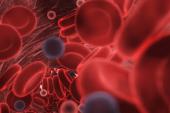COLCORONA: Mixed Results for Colchicine in Nonhospitalized COVID-19
The trial missed its primary endpoint, but an analysis confined to PCR-confirmed infections was more promising.

Full results for the placebo-controlled, COLCORONA trial are now published, showing that colchicine failed to reduce deaths or hospital admissions among people with confirmed or suspected COVID-19 being treated at home. But the drug appeared to be beneficial among patients whose diagnosis was confirmed by PCR tests.
Preliminary results from the study were first announced back in January 2021, as reported in TCTMD’s COVID-19 Dispatch; they were published yesterday in the Lancet Respiratory Medicine.
“Our study showed that colchicine reduces the occurrence of the primary endpoint of death or hospitalization by 25% in community-treated patients with PCR-confirmed COVID-19,” Jean-Claude Tardif, MD (Montreal Heart Institute, Canada), told TCTMD in an email. “The number needed to treat (NNT) to prevent one death or hospitalization for patients with PCR-confirmed COVID-19 is 70. We believe that an NNT of 70 is acceptable in the context of a pandemic, for a drug like colchicine that is inexpensive, safe, and widely available. In addition, the NNT is 29 for patients with diabetes, 31 for patients aged 70 years and older, 39 in men, 52 in patients with respiratory disease, and 25 in those with cardiovascular disease.”
Colchicine, an anti-inflammatory that has recently been shown to have cardiovascular benefits, has a patchy track record in COVID-19 to date. The RECOVERY trial investigators halted recruitment in the colchicine arm of their large study after seeing no convincing signs that the treatment was helping, but two smaller randomized trials out of Greece and Brazil showed signals of benefit for colchicine over placebo.
COLCORONA Results
Among 2,235 COLCORONA patients randomized to colchicine, 4.7% died or were hospitalized for COVID-19 at 30 days, as compared with 5.8% of the 2,253 patients randomized to placebo (OR 0.79, 95.1% CI 0.61-1.03).
In the early stages of the trial, patients could be admitted on the basis of COVID-19 symptoms rather than definitive tests (due to a lack of available tests), but as the authors note, these patients ultimately had half the event rates seen in patients with a confirmed diagnosis on PCR testing. In a prespecified analysis of the 4,159 patients with PCR-confirmed COVID-19, the primary endpoint occurred in 4.6% of patients in the colchicine group and 6.0% of placebo-treated patients (OR 0.75; 95% CI 0.57-0.99).
To TCTMD, Tardif noted that while the primary endpoint reported in the paper included only hospitalizations for COVID-19, additional analyses looking at all hospitalizations—which would capture any hospitalizations for which COVID-19 was not identified as a precipitating factor—yielded similar results.
Serious adverse events were numerically higher in the placebo group than in the colchicine group (6.3% vs 4.9%; P = 0.051), as were pneumonia cases (4.1% vs 2.9%; P = 0.021). Diarrhea, however, was nearly twice as common among the colchicine-treated patients (13.7% vs 7.3%; P < 0.0001).
COLCORONA was stopped early, when just 75% of patients were enrolled. Asked about the rationale for stopping, Tardif explained that the decision to terminate was made “due to substantial logistical, personnel, and budgetary issues related to maintaining the central study call center active 24 hours per day for a prolonged period of time, which were compounded by the inability to reliably model the additional time required to reach the target number of patients through the successive waves of the pandemic.”
Even with lower patient numbers than planned, “we nevertheless believe that our results are clinically persuasive,” Tardif and colleagues write. “Given the absence of orally administered therapies to prevent COVID-19 complications in community-treated patients, the burden on healthcare systems caused by hospital admissions, and the benefit of colchicine in patients with PCR-proven COVID-19, we propose that colchicine is a safe and inexpensive anti-inflammatory agent that could be considered for use in those at risk of complications.”
Window of Opportunity
In an accompanying editorial, Clark D. Russell, MBChB (University of Edinburgh, Scotland), points out that the dose used in COLCORONA (0.5 mg twice per day for 3 days, then once per day for 27 days) was slightly lower than that used in another autoinflammatory disease (familial Mediterranean fever), and that the patients enrolled in the study likely don’t represent the highest-risk patients for severe COVID-19 (the median age was 53 years in the treatment group and 55.4% were women).
“Further investigation in a higher-risk cohort might be warranted, aiming to recruit patients closer to symptom onset and possibly dosing colchicine closer to the recommendations for familial Mediterranean fever,” Russell writes. “This trial does, however, add proof of principle of two important therapeutic concepts—progression of COVID-19 lung injury can be inhibited to prevent hospital admission and anti-inflammatory therapy can achieve this.” On top of other evidence, he continues, COLCORONA supports the belief that there is a “window of opportunity” to intervene so as to derail the inflammatory trajectory of this disease, which has proved so lethal.
Tardif, too, stressed that timing is critical: “These results also demonstrate that prevention of the inflammatory storm with colchicine can affect the evolution of COVID-19 disease leading to hospital admission.”
Do these results support the use of colchicine in first-line management of nonhospitalized COVID-19 patients? “Probably not,” writes Russell. “The effect size was small and the NNT large.”
Shelley Wood was the Editor-in-Chief of TCTMD and the Editorial Director at the Cardiovascular Research Foundation (CRF) from October 2015…
Read Full BioSources
Tardif J-C, Bouabdallaoui N, L’Allier PL, et al. Colchicine for community-treated patients with COVID-19 (COLCORONA): a phase 3, randomised, double-blinded, adaptive, placebo-controlled, multicentre trial. Lancet Respir Med. 2021;Epub ahead of print.
Russell CD. Exploiting an early immunological window of opportunity in COVID-19. Lancet Respir Med. 2021;Epub ahead of print.
Disclosures
- Tardif reports receiving grants from the Government of Quebec, the National Heart, Lung, and Blood Institute of the US National Institutes of Health (NIH), the Montreal Heart Institute Foundation, the Bill & Melinda Gates Foundation, Amarin, Esperion, Ionis, Servier, and RegenXBio, along with grants and personal fees from AstraZeneca, Sanofi, and Servier, and grants, personal fees, and minor equity interests from Dalcor. Tardif’s institution has submitted a pending patent for a method of treating a coronavirus infection using colchicine, and a pending patent on early administration of low-dose colchicine after myocardial infarction, although Tardif has waived his rights in all patents related to colchicine and states that he does not stand to benefit financially if colchicine becomes used as a treatment for COVID-19.
- Russell reports no relevant conflicts of interest.





Comments